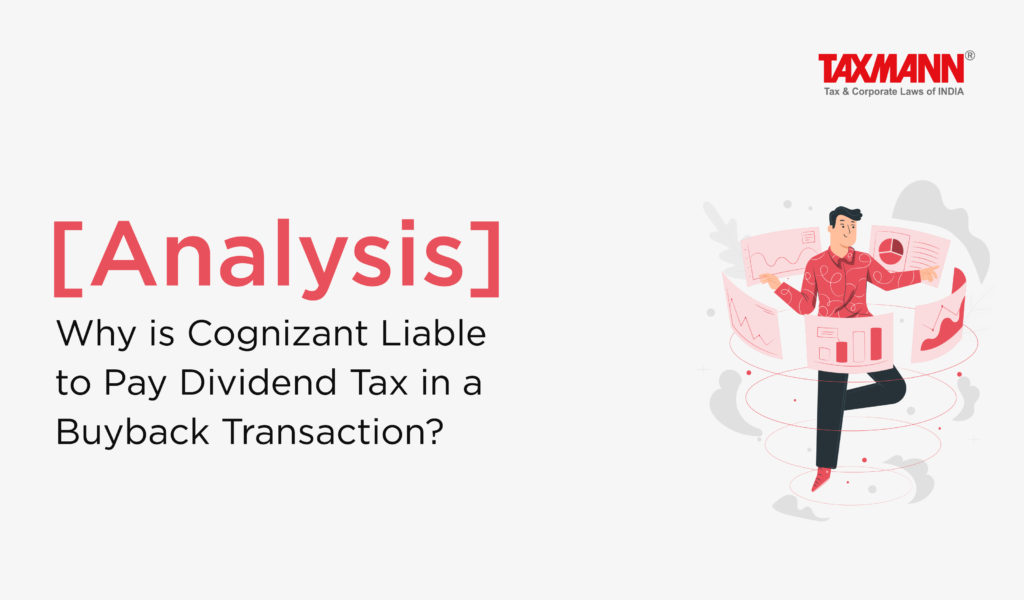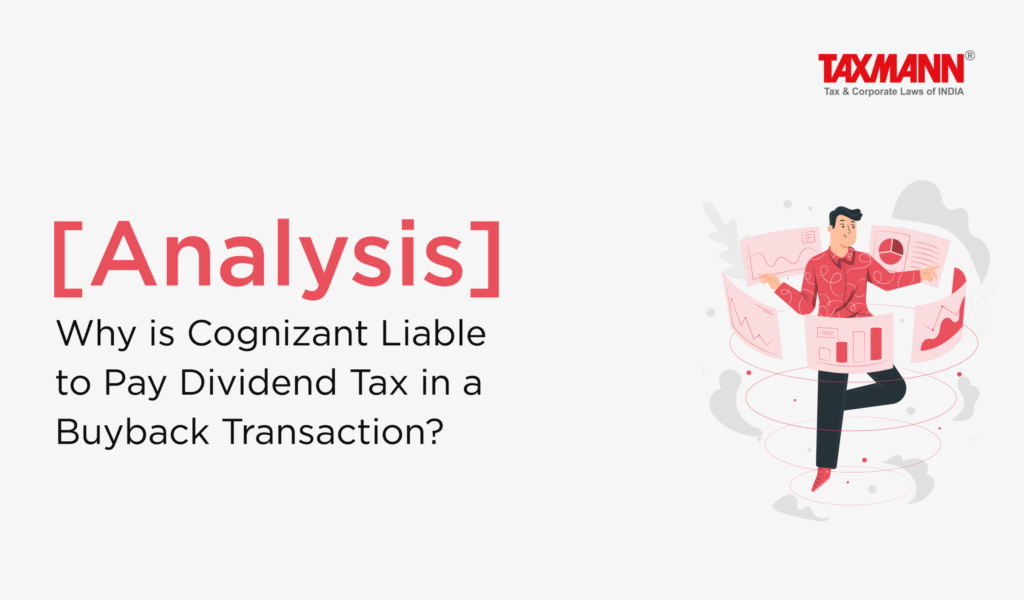
Table of Contents
- Introduction
- Tribunal’s Ruling
- Buyback v. Reduction of Capital
- Distribution of Income
- Deemed Dividend v. Capital Gains
- Scheme is Not binding on AO
- Conclusion
- Position as of date
1. Introduction
In a recent ruling, the Chennai ITAT has held that Cognizant Technology Solutions India (‘Cognizant’ or ‘assessee’) is liable to pay Dividend Distribution Tax (DDT) on Rs. 19,000 crores share buyback carried out through a scheme of arrangement. The ITAT held that the consideration paid by the company is the distribution of accumulated profits, attracting provisions of deemed dividend under Section 2(22) of the Income Tax Act, 1961 (‘IT Act’).
The matter dates back to the assessment year 2017-18. The assessee’s share capital was owned by four non-resident shareholders, three from the USA and one from Mauritius. The assessee acquired equity shares from all shareholders in compliance with a restructuring scheme approved by the Madras High Court. After the acquisition, the Mauritian entity became the majority shareholder with 99.87% shareholding and the remaining 0.13% retained by existing USA-based shareholders. Two USA-based shareholders completely liquidated their shareholding in this scheme.
The assessee withheld the tax from the consideration paid to the USA-based shareholders, considering it a capital gains transaction. However, due to the India- Mauritius tax treaty1, the tax was not withheld from the consideration paid to the Mauritian shareholder.
The Assessing Officer (AO) held that consideration paid by the assessee for the purchase of own shares was nothing but a reduction of capital in terms of Sections 100-104/402 of the Companies Act, 1956. Consequently, the consideration received by the shareholders was in the nature of the deemed dividend under Section 2(22)(d), and the assessee is liable to pay dividend distribution tax (DDT) under Section 115-O. He rejected all arguments of the assessee and computed DDT on the total consideration of Rs. 19,080.26 crores paid to its shareholders and computed tax liability of Rs. 4,853.42 crores. On appeal, the CIT(A) upheld the findings of AO. The matter reached before the Tribunal.
2. Tribunal’s Ruling
The Tribunal upheld the order of the AO, and to do so, the Tribunal looked through the transaction to conclude that it was a colourable device which was hastily executed on 18th May 2016 to evade the distribution tax under the amended provisions of Section 115QA that came into force from 1st June 2016.
Before the amendment, Section 115QA mandated the payment of distribution tax for the buyback transactions conducted under Section 77A of the Companies Act 1956 (CA’56), corresponding to Section 68 of the Companies Act 2013 (CA’13). Following the amendment, all buyback transactions were brought under the purview of distribution tax.
Regarding the question of why it should be classified as a distribution of income under Section 2(22)(d) rather than a buyback or transfer of shares, the Tribunal has conducted an assessment of the provisions within Section 2(22)(d) and has drawn a distinction between a buyback and a reduction of capital.
3. Buyback v. Reduction of Capital
The Companies Act allows a company to reduce its capital under the two routes – Automatic and Approval. As long as the company fulfils the requirements of Section 77A of the CA’56, it can buy back its shares without approval from NCLT. In the approval route, the company must prepare a scheme of compromise and arrangement and get it approved by the NCLT under Sections 391 to 393, read with Section 77 and Sections 100 to 104.
One of the conditions in the automatic route is that the capital reduction through buyback cannot be more than 25% of the company’s total paid-up capital and free reserves. If the company wishes to reduce its capital by more than 25%, it requires approval from court. In the present case, the assessee purchased more than 54% of its equity shares after the Madras High Court approved the scheme.
Since the buyback of shares by the assessee did not fall under the automatic route of Section 77A, it was not covered under the pre-amended Section 115QA.
4. Distribution of Income
Section 2(22)(d) covers distribution made to the shareholders by a company on reducing its share capital to the extent the company possesses accumulated profits.
Two essential prerequisites must be satisfied to come within the ambit of Section 2(22)(d). First, there must be a distribution to the shareholders on the reduction of the capital. Second, it must be to the extent that the company possess accumulated profits. The Supreme Court, in CIT v. G. Narasihan 236 ITR 327, has clarified that Section 2(22)(d) is automatically attracted once these parameters are satisfied.
The dictionary meaning of “distribution” is to give a share to several persons. The expression distribution connotes something actual and not notional. It can be physical and can also be constructive.
Thus, any distribution of a company’s accumulated profits to its shareholders, which involves releasing any portion of its assets, falls under the ‘dividend’ in Section 2(22) of the IT Act.
In the present case, it was evident from the audited financial statement that the share capital has been reduced by around 54.70% of the total paid-up share capital. Further, Clause 7 of the Scheme explains that the distribution of money will be out of the general reserves and accumulated credit balance in the profit and loss account. Thus, both conditions are satisfied to treat the transaction within Section 2(22)(d).
5. Deemed Dividend v. Capital Gains
The assessee argued that the payment made for buying back its own shares should only be taxed as capital gains in the hands of the shareholders under Section 46A of the IT Act. However, the ITAT disagreed with this argument. It clarified that Section 46A applies only when shares are bought back under the automatic route of Section 77A of the CA’56.
6. Scheme is Not binding on AO
The assessee made another argument that the purchase of shares was by way of a scheme sanctioned by the Madras High Court, which operates in ‘rem’ and is binding on the Revenue. The Tribunal rejected the contentions and held that the order sanctioning the scheme shall not grant immunity to the assessee from payment of taxes under any law for the time being in force. The role of the High Court in approving the scheme is very limited.
The High Court, while sanctioning the scheme, will merely look at the commercial wisdom of the creditors and approve the same if it is just and fair and there are no illegalities. The tax consequences and otherwise would be for the AO to look into the scheme in light of the relevant provision of the IT Act.
AO has full authority to assess the tax implications of the arrangement and determine its applicability under the IT Act. The AO’s legal obligation is to calculate the tax liability based on the approved ‘Scheme of Arrangement & Compromise’.
7. Conclusion
The case pertains to the assessment year 2017-18, when the pre-amended Section 115QA was in operation. As the buyback did not conform to Section 77A of the CA’56, the assessee escaped from paying any tax under Section 115QA. However, considering it as capital gain in the hands of shareholders under Section 46A was wrong. The tax authorities have rightly held that it was a ‘distribution of accumulated profits’ under Section 2(22)(d) and levied a dividend distribution tax.
8. Position as of date
If a company now goes for a reduction of capital under the automatic or approval route, the tax implications in such a transaction have been explained in the table below.
Situation | Implications on company | Implications on shareholders |
| Purchase of shares under automatic route of Section 68 of CA’13 | Liable to pay distribution tax under Section 115QA of the IT Act | Exempt under Section 10(34A) |
| Purchases of shares under the approval route of Section 66 of CA’13 with the distribution of the sum to shareholders | Liable to pay distribution tax under Section 115QA of the IT Act | Exempt under Section 10(34A) |
| Purchases of shares under the approval route of Section 66 of CA’13 without the distribution of the sum to shareholders | Section 115QA not applicable | No Implications |
| Reduction of paid-up value of shares under the approval route of Section 66 of CA’13 with the distribution of the sum to shareholders | Liable to pay distribution tax under Section 115QA of the IT Act | Exempt under Section 10(34A) |
| Reduction of paid-up value of shares under the approval route of Section 66 of CA’13 without the distribution of the sum to shareholders | No Implications | No Implications |
| Purchases of shares by a foreign company with the distribution of the sum to shareholders | No Implications | Capital gains shall be computed as per Section 46A |
| Reduction of paid-up value of shares by foreign company with the distribution of the sum to shareholders | No Implications | Capital gains shall be computed as per Section 46A |
| Reduction of paid-up value of shares by foreigncompany without the distribution of the sum to shareholders | No Implications | No Implications |
- Under the erstwhile Article 13(4) of the India-Mauritius DTAA, capital gains derived by a Mauritius resident from the alienation of shares of a company resident in India were taxable in Mauritius alone. However, pursuant to a protocol signed between both countries, the capital gains arising on or after 1st April 2017 from the alienation of shares of a company resident in India shall be subject to tax in India.
The post [Analysis] Why is Cognizant Liable to Pay Dividend Tax in a Buyback Transaction? appeared first on Taxmann Blog.



